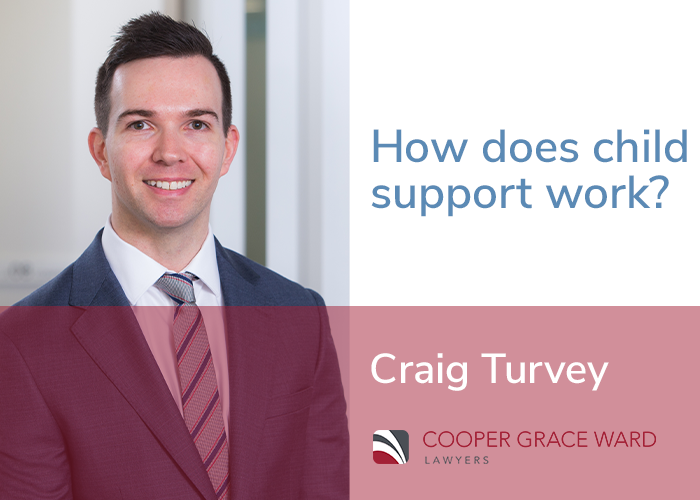In this video, senior associate Craig Turvey talks about child support, how it works and how it is calculated.
VIDEO TRANSCRIPT
My name is Craig Turvey and I’m a senior associate in the family law workgroup at Cooper Grace Ward.
Today I want to talk to you about child support and how that works. Child support is governed by Services Australia and it’s really just down to a formula. There’s three different variables. One is the number of children that you have. Two is the number of overnights that the children spend with both of the parents, and three is the parent’s taxable incomes.
Now, in terms of the second one, so the overnights, it’s purely down to the actual overnights the children spend. So, for example, a child could spend time with you from nine o’clock in the morning until six o’clock at night, and then go back to the other parent’s care and stay overnight with them. Despite you having a child essentially for most of the day, that doesn’t count as an overnight. So, particularly for younger children, parents can think the formula is a bit unfair, because they might not have any overnights for children who are very young and so that might be reflected in the formula of an increased sort of assessment, even though the child’s physically with them for a lot of the time. It’s just how the assessment works.
In terms of taxable incomes, it’s based generally on your previous taxable income, and you’re supposed to advise the department if that’s not an accurate reflection of your taxable income for this year. So, in terms of how the formula works, those three variables are entered in and it basically spits out a number and that’s what either you’re obligated to pay the other parent, or they’re obligated to pay to you. Parents can apply for an assessment through the department, and you should be aware of this sometimes when parents apply for a parenting payment, it’s supposed to automatically trigger an assessment because it’s basically the government’s way of knowing that people have separated and they’re applying for a particular parenting payment. So, sometimes, it automatically triggers an assessment for people even where they didn’t want it. So, just be aware of that. As you can imagine, from the formula, there’s only three variables, so it doesn’t take into account things that might be relevant for your children, such as school, private school fees, or you may have a child with special needs, who needs particular ongoing care or extra tutoring or medical needs, those types of things. The formula doesn’t take into account those things. So, once you have an assessment, based on the formula, you can then apply internally for a review through the department agency, if you say basically that the assessment is unfair, or that it doesn’t take into account certain circumstances, special circumstances of your child.
If you’re dissatisfied with the review process, and there’s multiple review processes through the agency internally, then you can apply to the Administrative Appeals Tribunal or a Court, although it’s very rare for people to apply for departure orders through a Court unless it’s tacked on to existing parenting or property settlement issues that are already before a judge.
If you have any questions about child support and how it operates or if you think that an assessment doesn’t take into account the special circumstances of your child, please don’t hesitate to contact me or one of the other family lawyers at Cooper Grace Ward.





